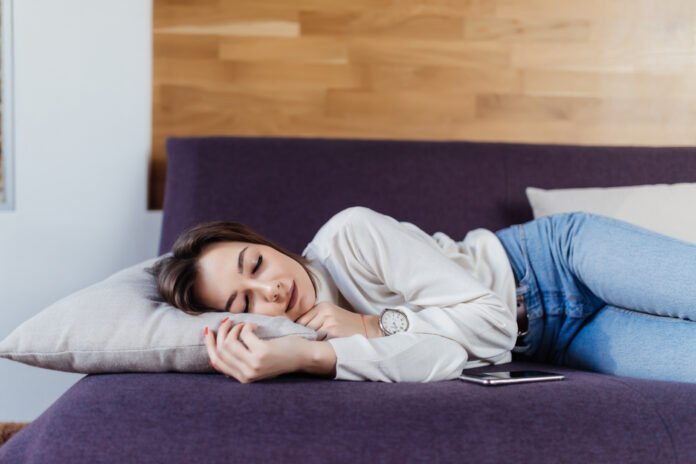Disturbance in circadian rhythm is a common problem for many people. It can cause irritation that affects the overall routine and internal health of a person. This issue can be resolved easily by just little changes in your routine life. If you are searching for some tips to improve your sleep quality and want to Fall Asleep Quickly, this article is for you. A disturbed sleep can cause a number of serious problems such as cardiovascular problems, mood disorders, type 2 diabetes, depression, impaired learning and memory loss. That’s why it is considered that good and comfortable sleep helps stay healthy.
Let’s dive into the depth of this article to learn how to Fall Asleep Quickly at night!
Top Tips to Fall Asleep Quickly at Night
Here’s some simple tips for you to have a comfortable and uninterrupted sleep at night. Following these strategies you can fall asleep faster.
Keep the Room Temperature Low
Your body has an amazing ability to control its internal temperature, known as thermoregulation. The hot temperature of your bedroom may affect your body’s thermoregulation ability. That may not be good for your sleep quality. A heated environment during sleep hours can impact your sleep cycle. Because after lying down for sleep, your body’s system begins to lose heat through dilation of blood vessels. This release of energy sends a message to your control system about onset of sleep. As a result your core body temperatures decrease down until waking up. Therefore, it is considered good to maintain your bedroom temperature low around 16 degree Celsius to 20 degree Celsius. This cooling temperature helps your body to fall asleep quickly and stay asleep peacefully throughout the night.
According to a 2019 study, taking a bath with warm water 2 to 3 hours before bedtime also stimulates your body’s thermoregulatory system and helps you fall asleep quickly. Another study also found that if you bathe in hot water with temperature 39 to 41 degree Celsius just 15 minutes before going to bed, you will enjoy a high quality and uninterrupted sleep.
Follow the 4-7-8 Breathing Mechanism
In the recent scientific and technological advancement era you can find a lot of effective techniques to fall asleep faster. Research and high quality authentic studies have made it easier for everyone to find the best way to have a peaceful sleep. The 4-7-8 breathing techniques are one of three effective methods that can help you sleep early at night without any effort. This technique actually promotes calmness as it is based on pranayama exercises in yoga.
Follow the steps spotted below:
- Place your tongue behind the upper front teeth.
- Make a whoosh sound while exhaling completely through your mouth.
- Now start counting from 1 to 4 and inhale through your nose.
- Hold your breath for a few seconds.
- Now start counting from 1 to 7 in your mind while opening your mouth for exhaling.
- Keep on counting to 8 while exhaling.
- Repeat the cycle for two more times.
Follow Your Sleep Schedule Strictly
Disturbed sleep schedule is one of the leading causes of disrupted sleep cycles. If you don’t follow a set pattern of sleep cycle, you must experience disturbance during sleep. A set sleep pattern always helps you fall asleep quickly. Your body also has its own clock that makes you feel alert in day time and sleep at night. This internal body clock is also known as circadian rhythm. The circadian rhythm plays a key role in your physiological cycles including thermoregulation and metabolism. Following the same timings for waking up and going to bed each day helps maintain your internal sleep-wake cycle.
In addition, your body adjusts itself to the set pattern and makes it easier for you to fall asleep around the same time everyday. Several studies support the idea that taking rest by lying down at least 25 to 30 minutes before going to bed can help promote sleepiness. This practice also makes your mind and body relaxed.
Exposure to Daylight and Darkness
According to many studies, exposure to light can help regulate your internal body clock which ultimately leads to regulating your sleep and wakefulness. Exposure to daylight is an effective source to help guide your internal body clock about timing, duration and quality of sleep. Every hour you send in daylight leads you to falling asleep at night. It also affects your sleep duration and reduces the sleep latency issues. Exposure to daylight greatly affects your evening fatigue and tiredness. It hinders melatonin production which is an essential hormone for good sleep at night.
So it’s important to maintain an equilibrium state between the time period you spend in daylight and darkness. You can do it easily by spending the whole day in daylight and using blackout curtains at night.
Meditation, Mindfulness, and Yoga
Mindfulness and meditation is a great way to boost your melatonin hormone. Meditation not only reduces your stress and makes your nerves calm, also improves your cognitive function and sleep quality. Mindfulness meditation also helps you focus on the present and avoid stressful thoughts. This helps you fall asleep quickly.
On the other hand, yoga has a positive impact on the quality, duration and efficiency of sleep. Yoga is a way of concentrating on yourself while practicing some breathing exercises in specific patterns. The breathing exercises along with certain body movements help release tension and stress from your body.
Avoid Staring the Clock Repeatedly
Almost every person experiences waking up in the middle of night. This means it’s a natural phenomenon. After waking up, most people go back to sleep but the odd thing happens when some people feel helpless in this matter. They can go to sleep after waking up at night. This causes frustration and botheration. People with insomnia often experience such situations where they can’t get back to sleep after weakening up in the middle of night. They used to stare at their clock and get worried as the time passed. This time-monitoring or clock watching behavior causes brain stimulation , anxiety and exacerbation that ends in the feelings of sleeplessness.
You can get rid of such feelings of sleep=-related anxiety by removing the clock from your bedroom. Replacing the clock with an alarm can help you avoid looking at the clock during bedtime and when you wake up at night.
Avoid Naps during the Day
If you’re habitual of taking naps during daytime, you would surely experience sleep latency at night. Daytime napping is the leading cause of insomnia. Anyhow, if the naps are short they might help improve alertness and well-being. The research about the effects of short naps during day time on late nighttime sleep are mixed. However an older study suggested that daytime napping causes waking up at the middle of night and inability to fall asleep quickly at night. It also disturbs your sleep quality and sleep duration.
According to an analytical review of 2018, daytime naps, whether they are short or long, cause disruption in night time sleep schedule. The researchers had found that daytime naps always impact your night sleep in a negative way. Now the question is, what is the impact of daytime napping on your sleep cycle. You can find the answer to the question by eliminating the naps thoroughly from your daytime schedule or limiting yourself to just a 15-20 minutes midday nap.
Avoid Eating before Bedtime
It is a noticeable point that people who are used to eating food near bedtime are more likely to develop sleep problems. Therefore, it is suggested that taking your meal maximum 2 to 3 hours before your bed time is a good habit. This habit increases the chance of a sound and uninterrupted sleep at night while having heavy meals near bedtime can cause sleep latency or waking up shortly after falling asleep. Trying to make a gap of at least 3 hours between your last meal of the day and bedtime can help you fall asleep quickly at night. You should also take a lighter meal as supper.
Listening to Music
Experts of sleep problems often suggest that listening to relaxing music near bedtime can help you fall asleep quickly at night. Listening to your favorite music at night sometimes helps reduce the frequency of chronic mental health condition symptoms. It also helps improve sleep quality duration and timing. It is considered a good source of achieving relaxation and comfort near bedtime which leads to reduction in anxiety. According to a review published in 2021, listening to music at least 20 minutes before bedtime creates a significant increase in sleep quality. This is also effective for the people who’re hospitalized. If you’re not interested in music, you can use earplugs or ear buds to block all the noises in the surrounding area to fall asleep faster.
Avoid Exercise in the Evening
Mindful exercise is effective for being fit physically and mentally. But its impacts become more fruitful when you maintain a moderate-intensity exercise routine with mindfulness. Experts suggest that physical activity at the start of the day proves helpful in establishing a balanced circadian rhythm and also helps promote sleep at night. But when you exercise in the evening, especially 2 to 3 hours before bedtime, it negatively impacts your sleep quality, duration and timing. It decreases your sleep quality and causes alertness when you want to fall asleep quickly at night.
Incorporating moderate exercises to your morning routine can help promote sleep. You can add moderate exercise to your daily routine through practicing:
- Lifting weights.
- Running.
- Cycling.
- Hiking.
- Swimming.
Add Comforts to Your Bedroom
A comfortable bedroom plays a role in falling asleep faster. Making the environment of the bedroom free from all distractions and noses can help feel relaxed when you’re lying on your bed. Comforts of the bedroom include comfortable bedding, soft pillow and blanket, blackout curtains and dim light. Cool temperature is also a luxurious addition to these comforts. A soft mattress promotes sleep quality and helps reduce back pain. This also helps limit muscular tension and sleep disruptions. Similarly, soft pillow also affects your:
- Body temperature.
- Spine and neck curve.
- Sleep positive.
Soft but slightly weighted blankets helping:
- Reducing symptoms of sleeplessness, anxiety and depression.
- Improving sleep duration and sleep quality.
- Restoring more energy in your body for the next day’s activities.
Last but not least, the fabric of clothes that you’re wearing has a special impact on your sleep hygiene. Therefore, it is good to choose soft and comfortable fabric that makes you feel relaxed and covered all night.
Avoid Using Electronics
Use of Electronic devices like video games, t.v, smartphone or tabs near bedtime hinder a good sleep pattern. These devices actually make it harder for your brain to get ready for sleep. That;s why you stay alert and it feels harder to fall asleep. The reason is emission of blue light from such devices which suppress the release of ,melatonin hormone that is necessary to induce sleepiness. Use of such devices keeps your brain engaged and keeps it awake. Therefore, it is recommended to use blue-light glasses to block out the blue light, if it is necessary to use electronic devices late at night. But the best thing is to put away all electronic devices at least 2 hours before lying in bed. This will help you make your mind and nerves relax which may lead to falling asleep quickly.
Conclusion
Trouble in falling asleep faster is the leading cause of mental health conditions. When you stay awake for many hours while lying on the bed at night and can’t sleep, this makes you frustrated and irritable. Using some effective techniques mentioned in this article will help you get rid of sleep problems like insomnia and sleep latency. The most important thing is to make your mind calm and relax before going to bed. The relaxed and comfortable bedroom environment plays a crucial role in promoting sleepiness. Good and uninterrupted sleep makes you healthy and able to stay alert and energetic for the night. Some techniques to promote sleepiness include morning exercise, keeping your bedding comfortable and soft, making your bedroom environment quiet, dark and cool, and avoiding blue-light devices and caffeinated beverages near bedtime.







